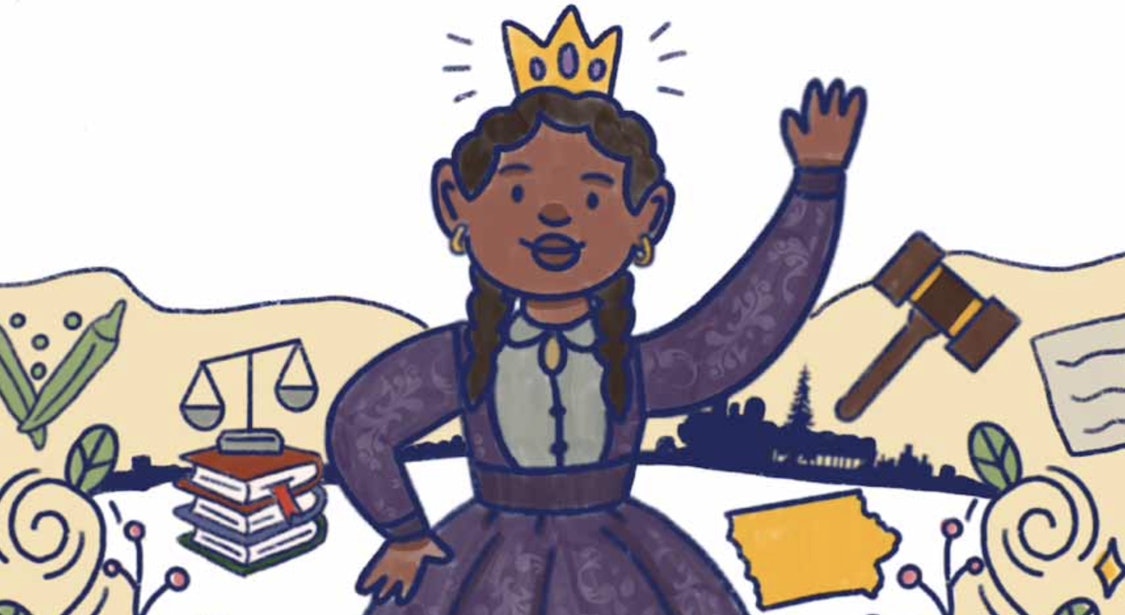
This column by Daniel G. Clark about Alexander Clark (1826-1891) first appeared in the Muscatine Journal on November 1, 2023.
Back in January I told of forthcoming books about Susan Clark and said she had a publicity problem.
“Never heard of her” was indeed a buzz surrounding the mid-October release of the picture book by author Joshalyn Hickey-Johnson and illustrator Hayle Calvin—“Susie Clark: The Bravest Girl You’ve Ever Seen: Desegregating Iowa Schools in 1868.”
Iowans, even long-time Muscatine residents, exclaimed that the true story was new to them.
Muscatine in the early days
had separate schools…
with very different ways.
One school in town had nice books
and room to play.
The other was way up a muddy
hill and far, far away.
I wrongly predicted a rap cadence, but when “Ms. Rocki” Hickey-Johnson read aloud at the launch event, her verse sounded more like Dr. Seuss.
Mean people then,
like mean people now,
wanted to be nice,
they just didn’t know how.
They had rules that were wrong
and needed to be made right.
The story happens mostly after the landmark ruling by the Iowa Supreme Court—the 1868 precedent that bears Susan’s name.
“But I’m just a kid,
I don’t know how to fight!
You shouldn’t even
ask me, that doesn’t
seem right!”
The court has spoken, and now it’s up to the 13-year-old to lead the way into a better future.
“They don’t like our
smiles, or our skin,
or our hair!”
Reluctant Susie’s elders coax her to assert equality with the white kids. Finally, with “courage building up inside,” she ventures alone toward the newly desegregated Muscatine High School.
Soon two school systems became one
with all kids together.
Susie’s dad changed the rules
and made it so much better.
Outside of Iowa, the story can be easily confused with better-known events in other times and places.
Case in point: November 14 will be Ruby Bridges Walk to School Day, which recalls a little Black girl flanked by federal marshals amid jeering white people. The annual observance is spreading across the nation.
Headline in the National Public Radio archive (September 7, 2022): “Ruby was the first Black child to desegregate her school.” The interview with Ruby herself, now approaching her seventies, is about the release of her book, “I Am Ruby Bridges: How one six-year-old girl’s march to school changed the world.”
The Susie Clark book is not a copycat, and this is not a competition. Ruby was born in 1954. Susie was born in 1854. Iowa’s racial segregation of the 1860s was not the South of the 1960s, but that’s the “product differentiation” challenge even if the market is only Iowa.
The day after the launch at Muscatine, author Rachelle Chase was a guest on the show “Rocki” Hickey-Johnson co-hosts at Waterloo.
Rocki: I want everyone to know that Rachelle has a book in the works, too, about the same character, Susie Clark.
Rachelle: Mine will be coming out, hopefully, fingers crossed, the first part of next year. It’s for middle-grade students. It’s called “The Time I was Susan Clark.” And, because there’s not a lot known about Susan Clark, we kind of decided to do a historical fiction book on her. So it’s a young Black girl today, in middle class, smart phone, all the little things that young people have. She actually gets thrown back in Time, and as Susan Clark. I wanted young people to be able to experience what life was like in 1867 and how momentous that particular event—integrating schools in Iowa, the lawsuit—how important and significant that was to Iowa history.
They discussed the nationwide marketing challenge.
Rachelle: Funny story. I had sent it to an agent to see if they were interested…and he said, “You know, I don’t know if that case is significant; I love the story—
Rocki: What?!
Rachelle: —could you change it to Brown versus the Board of Education?” I thought, that’s an entirely different book; why d—
Rocki: You’re kidding!
Rachelle: —doesn’t Iowa get this recognition, so, yeah, it’s a story that needs to be told. It’s a national story, you know, not just an Iowa story.
Rocki: I shared with the people at the book signing that my dad—I would always ask him “How come you went to school with white kids back in the ’30s and ’40s?” His answer was “I don’t know, we just did.” So now we know, it’s because of this brave little girl, Susie Clark.
The fall of 1868
was an autumn for the books.
Queen Susie and her Dad made IOWA take a look.
Now Susie Clark has a school
with her name in her town.
With lots of kids,
Black, white, and brown!
Nationwide acclaim or not, Iowa needs Susie’s story in a season of objections against telling history that might make white kids feel bad.
Read the book online, download a free PDF, and see ordering information at https://stanleycenter.org/iowa-community/susie-clark-book/.
Next time: Queen Susie and Grandmother Rebecca
